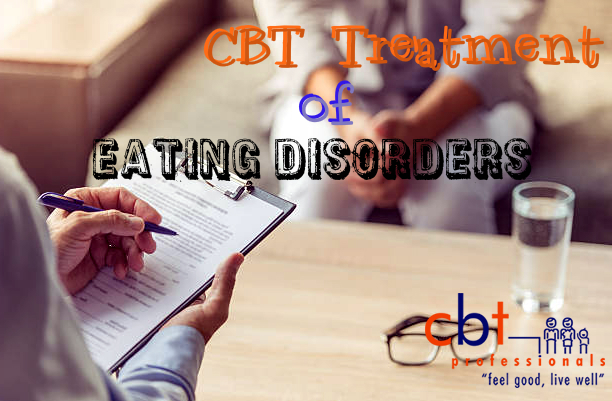CBT Treatment of Eating Disorders
Do I Have an Eating Disorder?
Do you have a love/hate relationship with food or eating? Do you have an intense fear of putting on weight or getting fat (regardless of your body shape or appearance)?
With so much social pressure on how we look, your self-worth may be based on how thin you are. Other signs include severely restricting your calorie intake by regular dieting or fasting, exercising excessively, vomiting after eating or using laxatives and diuretics. When your negative thoughts and feelings about your body image starts to control your life, you may have an eating disorder. Eating disorders can be dangerous and even life-threatening; interfering with your physical, psychological and social functioning. There are three common types of Eating Disorders including Bulimia Nervosa, Anorexia, and Binge Eating Disorder.
Can I Recover from an Eating Disorder?
Yes! Eating Disorders can be treated. If you are concerned that you may have an Eating Disorder, consult your GP who can refer you on to a team of health professionals who can support you with your recovery. These include psychologist, psychiatrist, paediatrician, dietitian or nutritionist, support groups and various complementary treatments. A combination of treatments is usually the most effective in treating an Eating Disorder.
Types of Treatment for Eating Disorders
Medical Intervention
Given the number of physical health issues caused by abnormal eating, it is recommended that you have regular check-ups and monitoring by your doctor. This includes regular monitoring of your heart rate, blood pressure and blood tests to monitor your potassium and mineral levels, and various bodily functions. Medication-based treatment may also be required if you have an Eating Disorder as well as another type of disorder or illness, such as depression or anxiety. Medications can be prescribed by psychiatrists or by medical doctors and should be used in conjunction with other treatments.
Nutrition
Consulting a nutritionist or dietician is an important part of your multi-disciplinary treatment approach. A dietician can provide education about nutritional needs and to assist with your meal planning. A nutritionist can also help you develop normal and healthy eating habits and behaviours.
Psychology
There are different types of psychological treatments for Eating Disorders. Some of the psychological approaches include: Cognitive Behavioural Therapy, Interpersonal Therapy, Dialectical Behaviour Therapy, Acceptance and Commitment Therapy, Family-Based Therapy FBT/Maudsley Method (for adolescents) and Group Therapy. Cognitive Behavioural Therapy has been shown to be effective in the treatment of eating disorders.
Cognitive Behavioural Therapy for Eating Disorders (CBT-E)
It would be normal to feel nervous about starting therapy, or anxious about the effects of treatment. The aim of treatment is to give you control over your eating rather than your eating controlling your life. Your psychologist will explain what your Eating Disorder is, what is involved with your treatment, what is expected of you, and answer any questions you may have.
CBT-E Treatment for Eating Disorders can take up to 20 sessions (and may be more for severe cases) and will progress through four stages:
- At Session 1, your psychologist will work with you to develop a treatment plan suited for your needs, help you better understand how your eating disorder developed, and what is maintaining your disorder.
- In Stage 1 of treatment, you will be introduced to a pattern of regular eating
- In Stage 2 of treatment, your progress will be reviewed and any barriers to change will be identified and strategies offered to help you manage them.
- In Stage 3 of treatment, key issues that are maintaining your disorder will be addressed including your fear of weight gain, restrictive eating behaviours, perfectionism and your sense of self-worth. Therapy will aim to identify unhelpful thinking styles, behaviours and “rules” around eating, shape and weight. Your thoughts can affect how you feel, which in turn affects what you do. CBT treatment will help you recognise your negative thoughts, challenge them and replace them with more helpful ones.
- Treatment will also help you manage your difficult emotions/moods so you can stick with your new eating habits.
- In Stage 4 of treatment, sessions will focus on maintaining the positive changes you have made, and to put plans in place to minimise the risk of relapse (e.g. preparing for a party or managing stressful situation).
Getting Help for an Eating Disorder
It’s never too early or too late to seek help. If you need more information about your eating disorder or about the treatment for eating disorders, please make an appointment and talk to one of our clinicians.
At CBT Professionals, we take a multi-disciplinary approach to treating eating disorders and our clinical psychologists work alongside an experienced dietician whom together focus on the treating eating disorders. Our psychologists and dietician are both located at our Gold Coast clinics for your convienience.
If you would like to consult our service, please download our Referral Information Sheet and take this to your GP. Remember to book an extended consultation with your GP so they can complete the necessary Care Plan referrals for your treatment with a psychologist and a dietician. For more information, please contact one of our friendly staff on CBT Professionals 5551 0251.
Disclaimer: Content on this website is provided for education and information purposes only and is not intended to replace advise from your doctor or registered health professional. Readers are urged to consult their registered practitioner for diagnosis and treatment for their medical concerns.
THREE CONVENIENT LOCATIONS
MOUNT GRAVATT
Mt Gravatt Medical PrecinctSE 105, 1808 Logan Rd
Upper Mount Gravatt QLD 4122


